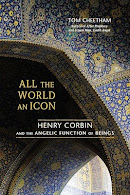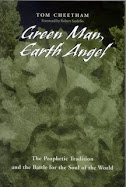"...the Imagination (or love, or sympathy, or any other sentiment) induces knowledge, and knowledge of an 'object' which is proper to it..."
Henry Corbin (1903-1978) was a scholar, philosopher and theologian. He was a champion of the transformative power of the Imagination and of the transcendent reality of the individual in a world threatened by totalitarianisms of all kinds. One of the 20th century’s most prolific scholars of Islamic mysticism, Corbin was Professor of Islam & Islamic Philosophy at the Sorbonne in Paris and at the University of Teheran. He was a major figure at the Eranos Conferences in Switzerland. He introduced the concept of the mundus imaginalis into contemporary thought. His work has provided a foundation for archetypal psychology as developed by James Hillman and influenced countless poets and artists worldwide. But Corbin’s central project was to provide a framework for understanding the unity of the religions of the Book: Judaism, Christianity and Islam. His great work Alone with the Alone: Creative Imagination in the Sufism of Ibn ‘Arabi is a classic initiatory text of visionary spirituality that transcends the tragic divisions among the three great monotheisms. Corbin’s life was devoted to the struggle to free the religious imagination from fundamentalisms of every kind. His work marks a watershed in our understanding of the religions of the West and makes a profound contribution to the study of the place of the imagination in human life.Search The Legacy of Henry Corbin: Over 800 Posts
Tuesday, August 25, 2009
Voices from the East
 Language For a New Century: Contemporary Poetry from the Middle East, Asia, and Beyond edited by Tina Chang, Nathalie Handal, and Ravi Shankar W.W. Norton. Reviewed by Craig Santos Perez.
Language For a New Century: Contemporary Poetry from the Middle East, Asia, and Beyond edited by Tina Chang, Nathalie Handal, and Ravi Shankar W.W. Norton. Reviewed by Craig Santos Perez.
Thursday, August 20, 2009
L'Immagine del tempo in Henry Corbin
 A new book, in Italian, to appear in September:
A new book, in Italian, to appear in September:Glauco Giuliano, L’Immagine del Tempo in Henry Corbin. Verso un’idiochronia angelomorfica. Milano-Udine, Mimesis 2009, p. 319, ISBN 978-88-8483-904-6. Description here (pdf).
Friday, August 14, 2009
5e JOURNEE HENRY CORBIN- AVANT PROGRAMME
 ASSOCIATION DES AMIS DE HENRY ET STELLA CORBIN (AAHSC)
ASSOCIATION DES AMIS DE HENRY ET STELLA CORBIN (AAHSC)7 Rue Nicolas Houël, 76005 Paris,
amiscorbin@free.fr
Président : Docteur Daniel Gastambide
Secrétaire général: Professeur Pierre Lory, EPHE, Sorbonne
Paris, le 13 août 2009
Chers Amis,
Nous nous réjouissons de vous revoir à la 5ème Journée Henry Corbin (programme préliminaire ci-dessous).
Vous pouvez vous procurer l’article de Julien Darmon dans « Nouvelles Clés » Décembre 2008- Janvier- Février 2009 ; pp 64-67: « Henry Corbin, philosophe des mondes intermédiaires » (see below - TC)
La cotisation annuelle de l'AAHSC reste à 15€ (quinze euros). Merci de l'adresser à l’Association des Amis de Henry et Stella Corbin, 7 Rue Nicolas Houël, 75005 Paris.
Avec nos sentiments cordiaux,
Daniel Gastambide, président
Pierre Lory, secrétaire
Marc Gastambide, trésorier
5e JOURNEE HENRY CORBIN- AVANT PROGRAMME
« Les religions abrahamiques et l’eschatologie »
Le samedi 19 décembre 2009 à l’Ecole Normale Supérieure,
45 rue d’Ulm, 75005 Paris
salle à préciser
« Les religions abrahamiques et l’eschatologie »
Le samedi 19 décembre 2009 à l’Ecole Normale Supérieure,
45 rue d’Ulm, 75005 Paris
salle à préciser
Matinée
9h 30 : Natale SPINETO (Université de Turin), « Fin des temps et vie après la mort – Modèles d’eschatologie dans les religions ».
10 h 30 : Serge MARGEL (Université de Lausanne), « Le témoignage, ou la vision eschatologique du martyr dans les religions du Livre »
11 h 30 : Christian JAMBET (Lycée Jules Ferry) : « L'eschatologie abrahamique du vrai fidèle dans le Commentaire du Verset de la Lumière de Mullâ Sadrâ ».
Après-midi
14 h 30 : Jean-Pierre LAURANT (EPHE), « Quelques dérives eschatologiques chez les occultistes français du XIXe siècle »
15 h 30 : Mojane MEMBRADO, « L'eschatologie chez les Ahl-e Haqq »
Henry Corbin, philosophe des mondes intermediaires
Monday, August 10, 2009
On Poetry & the Religious Imagination
 I pass along these links courtesy of Ron Silliman's Blog.
I pass along these links courtesy of Ron Silliman's Blog.First, a short but very nice REVIEW ESSAY: "The Things of This World" by David E. Anderson. This clear and useful (if overly simple) review of the "sacramental and the dialectical" seems to me particularly pertinent to Corbin's apophatic and "angelological" theology which is neither "Catholic" nor "Protestant" in the sense of this essay, but partakes of both. I think students of Corbin will find the piece thought-provoking.
And also "Karbala as a poetic metaphor and Iftikhar Arif " By Rauf Parekh.
Tuesday, August 4, 2009
Norman O. Brown on Islam and the Prophetic Tradition
 The lectures of Norman O. Brown (1913-2002) on Islam and the prophetic tradition are now available from North Atlantic Books. At the time of his death Brown was Professor of Humanities, Emeritus, at the University of California, Santa Cruz. (See this interesting obituary in Radical Philosophy). His reading of Islam was greatly influenced by Corbin's work and the fascinating and powerful essays already in print are landmark studies in the creative understanding the broad sweep of the prophetic tradition pioneered by Corbin. These essays "The Prophetic Tradition," and "The Apocalypse of Islam," appear in Apocalypse &/or Metamorphosis, Berkeley: University of California Press, 1991. This is from the publisher's description:
The lectures of Norman O. Brown (1913-2002) on Islam and the prophetic tradition are now available from North Atlantic Books. At the time of his death Brown was Professor of Humanities, Emeritus, at the University of California, Santa Cruz. (See this interesting obituary in Radical Philosophy). His reading of Islam was greatly influenced by Corbin's work and the fascinating and powerful essays already in print are landmark studies in the creative understanding the broad sweep of the prophetic tradition pioneered by Corbin. These essays "The Prophetic Tradition," and "The Apocalypse of Islam," appear in Apocalypse &/or Metamorphosis, Berkeley: University of California Press, 1991. This is from the publisher's description:Brown writes that "the prophetic tradition is an attempt to give direction to the social structure precipitated by the urban revolution; to resolve its inherent contradictions; to put an end to its injustice, inequality, anomie, the state of war . . . that has been its history from start to finish." Affiliating himself with prophets from Muhammad to Blake and Emerson, Brown offers further meditations on what's wrong with Western civilization and what we might do about it. Thus the duality in his title: crisis and the hope for change.
In Brown's analysis, what Henry Corbin and Louis Massignon have shown us is that the central questions for the whole Prophetic tradition after Mohammed are "Who is Khidr?" and "What does it mean to be a disciple of Khidr?" These questions are the legacy of Islam for the western, post-Christian world.
(A related essay that references Brown's work is "Antidote to Modern Nihilism: The Qur’anic Perception of Time," by S. Parvez Mansoor.)
 The Challenge of Islam: The Prophetic Tradition is distributed by Random House.
The Challenge of Islam: The Prophetic Tradition is distributed by Random House.Table of Contents
A Note on the Edition
Introduction by Jay Cantor
Lecture #1: Universal History with Cosmopolitan Intent
Lecture #2: Islam and Judaism (Ebionism)
Lecture #3: Islam and Christianity (Docetism)
Lecture #4: The Book
Lecture #5: The Succession (Sunnî and Shî'ite)
Lecture #6: Revolutionary Islam
Lecture #7: Mystic Islam
The Essential Books
Appendix: Shî'ite Islam: The Politics of Gnosticism
The publisher's description follows:
The Prophetic Tradition: The Challenge of Islam is an enlightening set of lectures given by Norman O. Brown during the 1980s, exploring a wide-ranging array of topics concerning Islam. Brown reveals the overlooked relationship between Islam and early Christianity, exploring Islam’s relation to, and revision of, the Christian tradition, the literary innovation of the Qu’ran, the nature of revolutionary and political Islam, and the vision of a world civilization. Throughout these lectures, which are remarkably pertinent today, Brown seeks to educate the reader on misunderstood areas of Islam, including the split between the Sunni and Shi’ite sects and Islam’s exemplification of the broad themes of art and imagination in human life. The author’s world-historical perspective of religion and tradition gives readers a crucial alternative to the divisive “clash of civilizations” view that paints Islam as at odds with the West. He exposes the unifying strands between Islam and early Judeo-Christian doctrine, showing that Islam is in fact a genuine part of “Western” tradition, and more importantly, part of a global tradition that embraces us all.
Subscribe to:
Posts (Atom)





